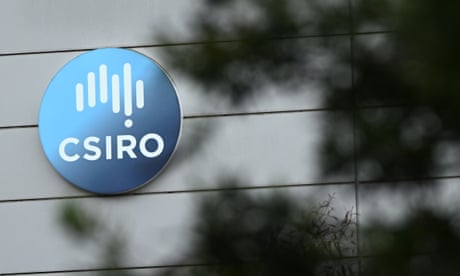- by foxnews
- 23 May 2025
CSIRO aims to ‘accelerate commercialism’ in new strategy as staff decry scientific diversion
CSIRO aims to ‘accelerate commercialism’ in new strategy as staff decry scientific diversion
- by theguardian
- 24 Oct 2022
- in news

Australia's leading science agency, the CSIRO, has unveiled a "significant" new working model to promote commercial deals, in a move towards reliance on external funding that one top scientist claims will be "crippling".
Guardian Australia understands the focus shift has been done without informing the science minister, Ed Husic.
In a presentation on 14 October, the Commonwealth Scientific and Industrial Research Organisation (CSIRO) told more than 200 senior staff there was an opportunity to "make some significant fundamental changes", according to a document supplied to Guardian Australia.
Entitled "New proposed structures for Growth", the plan states that while "significant progress" had been made in the past five years, there was "a growing need to operate seamlessly as "one-CSIRO in our research, customer and partner relationships".
It also highlighted "accelerate commercialisation" as the top objective in CSIRO's 2022-23 strategy. Among seven strategic priorities, for instance, "science-driven university partnerships" would shift to "impact-driven university partnerships".
"I nearly fell off my seat," said one senior staff member, who added the changes would amp up demands to find so-called "mission-scale market interventions".
The scientist, who requested anonymity, said the growth structure put "on steroids" the existing dependence on commercial tie-ups, adding "a lot of people don't like the way it's headed".
"We just really want to make science," the person said. "It's going to cripple us."
Another senior researcher said the plan would consolidate requirements for even basic research - such as critical observations for climate change - to secure 70% external funding. "Otherwise, I won't get it past my managers for approval".
"The CSIRO is an independent government body," a spokesperson for Husic said. "While it makes organisational decisions and enters commercial arrangements at arms-length from government, the minister looks forward to being consulted on important changes."
A CSIRO spokesperson said it was "currently working through its operating model for the growth team within CSIRO, which spans customer support, program delivery, partnerships, investments and commercialisation".
"Consultation with staff is ongoing. While not finalised, the model aligns completely to CSIRO's corporate plan," the spokesperson said. "Science and research is what CSIRO delivers and we are committed to science that provides positive economic, environmental and social impact."
"The assertion of a 'business-over-science' approach is incorrect," they said, citing research ranging from Japanese encephalitis to bushfire behaviour and radio astronomy as examples of public-good science.
A former CSIRO scientist who negotiated contracts said taxpayers often subsidised corporations that had the means to do the work themselves. These include Telstra, Tassal, Rio Tinto and Fortescue.
"You and I are funding a hefty portion of projects with companies who can well afford to pay their own way, while smaller companies who really do need that government help can't meet the get-out-of-bed threshold," the ex-staffer said.
The implications, though, were not just for corporate welfare but the on diversion of science.
"The research questions are driven by the client, which means that the results are very skewed toward the outcomes that the client wants, not driven by what's good for the country, nor even what objectively drives science forward," the scientist said.
"[T]hey are almost invariably commercial-in-confidence, which means that we can't see the findings of the research we are paying for," they said.
The salmon industry offered one example, where companies at the time put up 60% of funding and CSIRO 40%. "[The] salmon [industry] set the terms of reference for the project, [they] kept the intellectual property, all findings were unpublishable without the client['s] 'OK' as commercial-in-confidence," the former staffer said.
Work that might produce adverse findings was avoided, the staffer claimed.
"They wouldn't research the question of whether salmon farming is sustainable in coastal ecosystems, where it might be found that it isn't," the person said. "[R]ather, they would research how to minimise stock loss due to amoebic gill disease."
"The days of discovering wifi are over," the person said, referring to one of CSIRO's most famous inventions.
"Today, it would not be discovered by curious scientists. It would only be discovered if the client contracted it, in which case, it would be proprietary and profitable to that client, not to the Australian people."
The CSIRO spokesperson said such a view did not give "appropriate recognition of the work being delivered by the scientists of the CSIRO who are making breakthroughs and working every day for the benefit of the nation".
- by foxnews
- descember 09, 2016
United Airlines flight returns to Hawaii after concerning message found on bathroom mirror; FBI investigating
United Airlines Flight 1169 to Los Angeles returned to Hawaii after a "potential security concern" aboard the plane. The FBI and police are investigating.
read more


